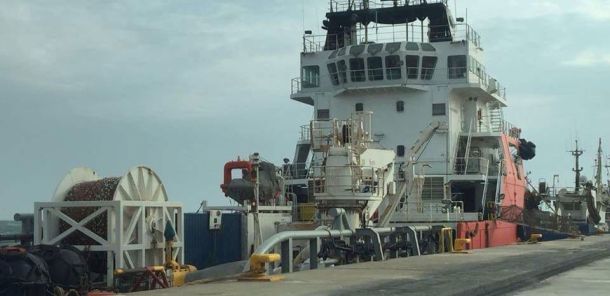Article published by AFP 19. november 2013
New conflict brewing over oil prospecting off W.Sahara
Rabat (Morocco) - 19 November 2013 - AFP (Simon MARTELLI) - FOCUS
Unprecedented plans by an international oil consortium to drill in waters off the disputed Western Sahara are making waves, with activists warning the move could scupper chances of resolving the conflict.
The region remains bitterly contested, nearly 40 years after its annexation by Morocco, a move never recognised by the international community.
Moroccan exploitation of the territory's natural resources has been a key issue in the dispute with the Polisario Front, who fought for independence until a UN-brokered ceasefire in 1991.
A surge of interest in its potential subsea riches, coupled with Morocco's unaffordable energy bills, has pushed oil exploration up the agenda, threatening to enflame tensions if any discoveries are made.
Last month, Texas firm Kosmos Energy and Britain's Cairn Energy announced plans to sink a well next year in the Cap Boujdour block in the waters of Western Sahara. Cairn said the permit lay 50 kilometres (30 miles) "offshore Morocco."
Kosmos insists its activities are consistent with international law.
But Erik Hagen, who heads Western Sahara Resource Watch, an international lobby group, said it was the most specific announcement of an exploration well to date and called it a "very worrisome development."
"What the oil companies are doing is making it impossible to solve the conflict. Morocco would have no incentive to enter into any purposeful UN peace talks with an oil find," Hagen said.
Others caution there is nothing illegal about exploration activity authorised by Morocco, the de facto administering power in the region, but say that could change.
"If oil were found, it would raise a lot of questions about how it was going to be exploited and how to ensure the people of Western Sahara benefit," a diplomat in Rabat told AFP.
Legal opinions
Rabat has vowed to invest in Western Sahara, with a palace-appointed council last week calling for a 13 billion euro ($18 billion) plan, which could double the region's GDP and create 120,000 jobs.
The controversy over Morocco's right to exploit the resources of the region, which it considers an integral part of its territory, centres on a 2002 UN legal opinion.
The Security Council requested the opinion in response to two exploration contracts, since relinquished, that Moroccan authorities signed with US firm Kerr McGee and French firm Total.
The document concludes if exploration and exploitation activities were to take place "in disregard of the interests and wishes of the people of Western Sahara, they would be in violation of the principles of international law."
Kosmos says it operates ethically, arguing resource development can create significant benefits for the Sahrawi people and that its activities are in compliance with the UN legal opinion.
Francesco Bastagli, a former UN special representative to Western Sahara, disagrees.
"Morocco has been engaged with the phosphates and the fisheries and now with the oil in a practice that is not legal under international law, which is confirmed in the 2002 opinion," he told AFP.
"The oil companies, rather than investing now, which is frankly unethical, should maybe lobby with their governments so that they make a real effort to legalise whatever status the Western Sahara should have."
Bastagli said it was not for Morocco or its partners to decide whether the exploitation of their resources was benefiting the Sahrawi people, whose UN-sponsored referendum on self-determination has been shelved.
'Unequal development'
Morocco is the leading global exporter of phosphates, and the main economic activity in Western Sahara is the extraction of the mineral from the Bou Craa region, by state-owned phosphate company OCP.
Ex-finance minister Nizar Baraka said the local population was reaping the benefits from state investments in Western Sahara, which amounted to "10 times" the revenues it generated.
"OCP reinvests its profits in the region," he insisted.
But Mustapha Naimi, a Sahrawi anthropologist at Rabat University, denies this, saying Morocco had plundered phosphate reserves, and criticising the lack of transparency in the industry.
Despite some investment, Naimi said regional development had been "very unequal," and the state had failed to instill among Sahrawis a belief in the "Moroccan-ness of the Sahara."
However, Maghreb expert and energy analyst Jon Marks argues wider economic realities, including new offshore drilling technology and high oil prices, together with the lack of progress in peace negotiations may be working in Morocco's favour.
"The fact that Kosmos was able to persuade Cairn to come into that block shows that the whole business of Morocco awarding acreage in Western Sahara is no longer such a toxic product," he said.
Kosmos and Cairn have pulled out of Western Sahara
17 years of US private company engagement in exploring the oil potential of Western Sahara has come to an end.
Kosmos surveying oil potential near Dakhla again?
Over the past 24 hours, WSRW has observed a resumed seabed exploration north of Dakhla, in the block operated by American oil company Kosmos Energy in collaboration with Scotland's Cairn Energy.
Kosmos/Cairn oil study in occupied waters has ended
Here is Kosmos Energy's supply vessel in occupied Western Sahara
Kosmos and Cairn Energy are exploring for oil offshore Western Sahara, occupied by Morocco. This photo taken yesterday shows one of their supply vessels.



